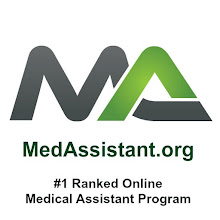Occupations in the Industry: Healthcare: Professions: Medical Assistant
Professional occupations, such as physicians and surgeons, dentists, registered nurses, social workers, and physical therapists, usually require at least a bachelor’s degree in a specialized field or higher education in a specific health field, although registered nurses also enter through associate degree or diploma programs. Professional workers often have high levels of responsibility and complex duties. In addition to providing services, these workers may supervise other workers or conduct research.
Other health professionals and technicians work in many fast growing occupations, such as medical records and health information technicians and dental hygienists. These workers may operate technical equipment and assist health diagnosing and treating practitioners. Graduates of 1-year or 2-year training programs often fill such positions; the jobs usually require specific formal training beyond high school, but less than 4 years of college.
Service occupations attract many workers with little or no specialized education or training. For instance, some of these workers are nursing aides, home health aides, building cleaning workers, dental assistants, medical assistants, and personal and home care aides. Nursing or home health aides provide health-related services for ill, injured, disabled, elderly, or infirm individuals either in institutions or in their homes. By providing routine personal care services,personal and home care aides help elderly, disabled, and ill persons live in their own homes instead of in an institution. Although some of these workers are employed by public or private agencies, many are self-employed. With experience and, in some cases, further education and training, service workers may advance to higher level positions or transfer to new occupations.
Most workers in health care jobs provide clinical services, but many also are employed in occupations with other functions. Numerous workers in management and administrative support jobs keep organizations running smoothly. Although many medical and health services managers have a background in a clinical specialty or training in health care administration, some enter these jobs with a general business education.
Each segment of the health care industry provides a different mix of wage and salary health-related jobs.
Hospitals. Hospitals employ workers with all levels of education and training, thereby providing a wider variety of services than is offered by other segments of the health care industry. About 3 in 10 hospital workers is a registered nurse. Hospitals also employ many physicians and surgeons, therapists, and social workers. About 1 in 5 hospital jobs are in a service occupation, such as nursing, psychiatric, and home health aides, or building cleaning workers. Hospitals also employ large numbers of office and administrative support workers.
Nursing and residential care facilities. About 2 out of 3 nursing and residential care facility jobs are in service occupations, primarily nursing, psychiatric, medical assistants, and home health aides. Professional and administrative support occupations make up a much smaller percentage of employment in this segment, compared to other parts of the health care industry. Federal law requires nursing facilities to have licensed personnel on hand 24 hours a day and to maintain an appropriate level of care. More info. about Medical Assistant Schools.


<< Home